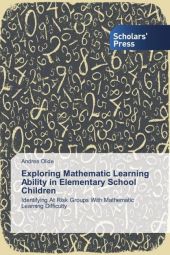 Neuerscheinungen 2016Stand: 2020-02-01 |
Schnellsuche
ISBN/Stichwort/Autor
|
Herderstraße 10
10625 Berlin
Tel.: 030 315 714 16
Fax 030 315 714 14
info@buchspektrum.de |

Andres Olide
Exploring Mathematic Learning Ability in Elementary School Children
Identifying At Risk Groups With Mathematic Learning Difficulty
2016. 116 S. 220 mm
Verlag/Jahr: SCHOLAR´S PRESS 2016
ISBN: 3-659-83894-2 (3659838942)
Neue ISBN: 978-3-659-83894-1 (9783659838941)
Preis und Lieferzeit: Bitte klicken
The importance of mathematics at an early age stems from the finding that early competence is likely to lead to future mathematics achievement. Moreover, individuals that do well in mathematics are likely to have increased overall income earnings, while individuals that do not perform as well in mathematics are essentially limiting their potential for career options and labor market earnings. Studies have proposed processes related to mathematic underachievement that describe different ability groups to explain deficits in mathematics. This study investigated whether discrete latent classes can be observed in children within the continuum of mathematic achievement ability. The findings provided partial evidence for the hypothesized ability groups along the math achievement ability distribution. The ability groups observed were further tested for external validity. Evidence for the external validity of measures suggests that the indicators played a critical role in distinguishing between ability groups. Results gathered from this research support the notion of mathematics learning ability groups and improves the identification of children at risk for math difficulties.
Andres Olide received a Master´s degree in Research Psychology from San Francisco State University--he was awarded the 2008 Christina Maslach-Philip Zimbardo Research Award. Andres earned a Ph.D. from the University of California, Riverside in Educational Psychology, where he worked on identifying children at risk for mathematics difficulties.


